Hella Moja played the title role in the German silent melodrama Heide-Gretel (Otto Rippert, 1918). The film was produced by Erich Pommer for the Decla-Filmgellschaft. Rotophoto published a series of five sepia postcards in the Film-Sterne series of the film.
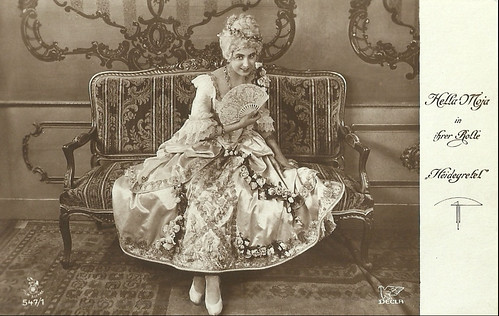
German postcard in the Film-Sterne series by Rotophot, no. 547/1. Photo: Decla. Publicity still of Hella Moja in Heide-Gretel (Otto Rippert, 1918).
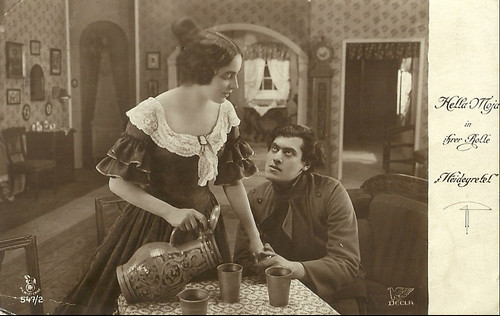
German postcard in the Film-Sterne series by Rotophot, no. 547/2. Photo: Decla. Publicity still of Hella Moja in Heide-Gretel (Otto Rippert, 1918). The man is probably Max Ruhbeck.
Hella Moja was one of the most popular stars of the German cinema during the First World War. In 1918, she even founded her own production company. In February 1918, her film Heide-Gretel, directed by Otto Rippert, premiered at the Berlin Marmorhaus cinema. Heide-Gretel was still produced by the Decla-Filmgellschaft, lead by Erich Pommer, who would later produce such classics as Das Cabinet des Dr. Caligari (Robert Wiene, 1920) and Metropolis (Fritz Lang, 1925). The cinematography was done by Carl Hoffmann.
The script by Carl Schneider tells the story of Heide-Gretel (Hella Moja), who has hard times in the inn 'Zum Mooskrug'. The landlord, her foster-father, beats her for every little mistake. When he wants to beat her again because she accidentally dropped glasses, two men protectively stand before her: Konrad and the ballet master Pankratius.
Heide-Gretel does not want to stay in this place any longer and runs out into the snow-covered forest, crying bitterly. Exhausted and desperate, the girl falls into a deep sleep despite the cold. Then she starts to dream...
In her dream, Konrad and Pankratius are by her side. She is led into the house of the ballet master, where the chamberlain of the sovereign has just arrived to discuss the upcoming ballet production. When Gretel starts to sing, the Chamberlain is delighted and leads her to the castle of the Prince. In her dream, the Prince suddenly falls in love with Gretel and wants to make her his wife, but she only agrees on condition he takes her protector Konrad to his court. Out of love for her, the Prince accepts Gretel's request.
When Konrad is at court, the Prince surprises his future wife on the morning of the wedding in his arms. The Prince has the rival thrown into a dungeon, but he soon frees him again at Gretel's request. Then she murders the Prince in her dream, whereupon she is arrested. To avoid the executioner, Konrad brings her poison so that she can die by her own hand. Konrad joins her into her death. From this nightmare, Gretel no longer awakens. People will find her frozen in the snow the next morning.
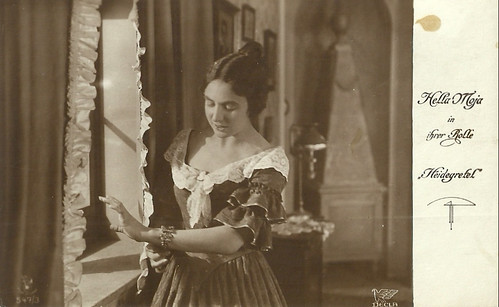
German postcard in the Film-Sterne series by Rotophot, no. 547/3. Photo: Decla. Publicity still of Hella Moja in Heide-Gretel (Otto Rippert, 1918).
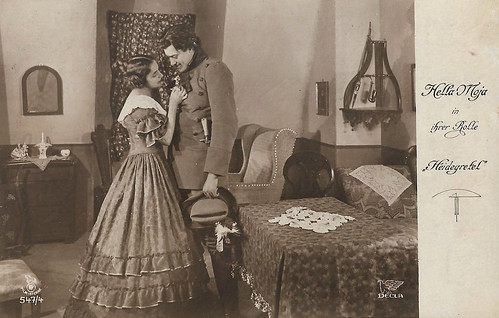
German postcard in the Film-Sterne series by Rotophot, no. 547/4. Photo: Decla. Publicity still of Hella Moja in Heide-Gretel (Otto Rippert, 1918). The man is probably Max Ruhbeck.
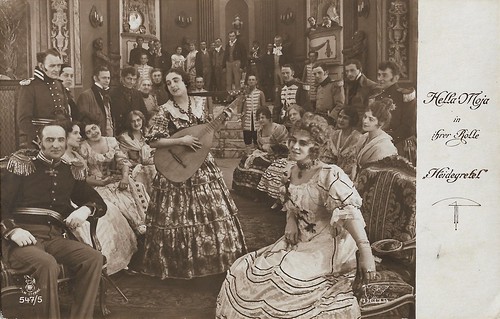
German postcard in the Film-Sterne series by Rotophot, no. 547/5. Photo: Decla. Publicity still of Hella Moja in Heide-Gretel (Otto Rippert, 1918). The man left could be Leopold von Ledebur, the Prince in the film.
Source: Wikipedia (German), Filmportal.de, and IMDb.

German postcard in the Film-Sterne series by Rotophot, no. 547/1. Photo: Decla. Publicity still of Hella Moja in Heide-Gretel (Otto Rippert, 1918).

German postcard in the Film-Sterne series by Rotophot, no. 547/2. Photo: Decla. Publicity still of Hella Moja in Heide-Gretel (Otto Rippert, 1918). The man is probably Max Ruhbeck.
A Nightmare in the Snow
Hella Moja was one of the most popular stars of the German cinema during the First World War. In 1918, she even founded her own production company. In February 1918, her film Heide-Gretel, directed by Otto Rippert, premiered at the Berlin Marmorhaus cinema. Heide-Gretel was still produced by the Decla-Filmgellschaft, lead by Erich Pommer, who would later produce such classics as Das Cabinet des Dr. Caligari (Robert Wiene, 1920) and Metropolis (Fritz Lang, 1925). The cinematography was done by Carl Hoffmann.
The script by Carl Schneider tells the story of Heide-Gretel (Hella Moja), who has hard times in the inn 'Zum Mooskrug'. The landlord, her foster-father, beats her for every little mistake. When he wants to beat her again because she accidentally dropped glasses, two men protectively stand before her: Konrad and the ballet master Pankratius.
Heide-Gretel does not want to stay in this place any longer and runs out into the snow-covered forest, crying bitterly. Exhausted and desperate, the girl falls into a deep sleep despite the cold. Then she starts to dream...
In her dream, Konrad and Pankratius are by her side. She is led into the house of the ballet master, where the chamberlain of the sovereign has just arrived to discuss the upcoming ballet production. When Gretel starts to sing, the Chamberlain is delighted and leads her to the castle of the Prince. In her dream, the Prince suddenly falls in love with Gretel and wants to make her his wife, but she only agrees on condition he takes her protector Konrad to his court. Out of love for her, the Prince accepts Gretel's request.
When Konrad is at court, the Prince surprises his future wife on the morning of the wedding in his arms. The Prince has the rival thrown into a dungeon, but he soon frees him again at Gretel's request. Then she murders the Prince in her dream, whereupon she is arrested. To avoid the executioner, Konrad brings her poison so that she can die by her own hand. Konrad joins her into her death. From this nightmare, Gretel no longer awakens. People will find her frozen in the snow the next morning.

German postcard in the Film-Sterne series by Rotophot, no. 547/3. Photo: Decla. Publicity still of Hella Moja in Heide-Gretel (Otto Rippert, 1918).

German postcard in the Film-Sterne series by Rotophot, no. 547/4. Photo: Decla. Publicity still of Hella Moja in Heide-Gretel (Otto Rippert, 1918). The man is probably Max Ruhbeck.

German postcard in the Film-Sterne series by Rotophot, no. 547/5. Photo: Decla. Publicity still of Hella Moja in Heide-Gretel (Otto Rippert, 1918). The man left could be Leopold von Ledebur, the Prince in the film.
Source: Wikipedia (German), Filmportal.de, and IMDb.
No comments:
Post a Comment